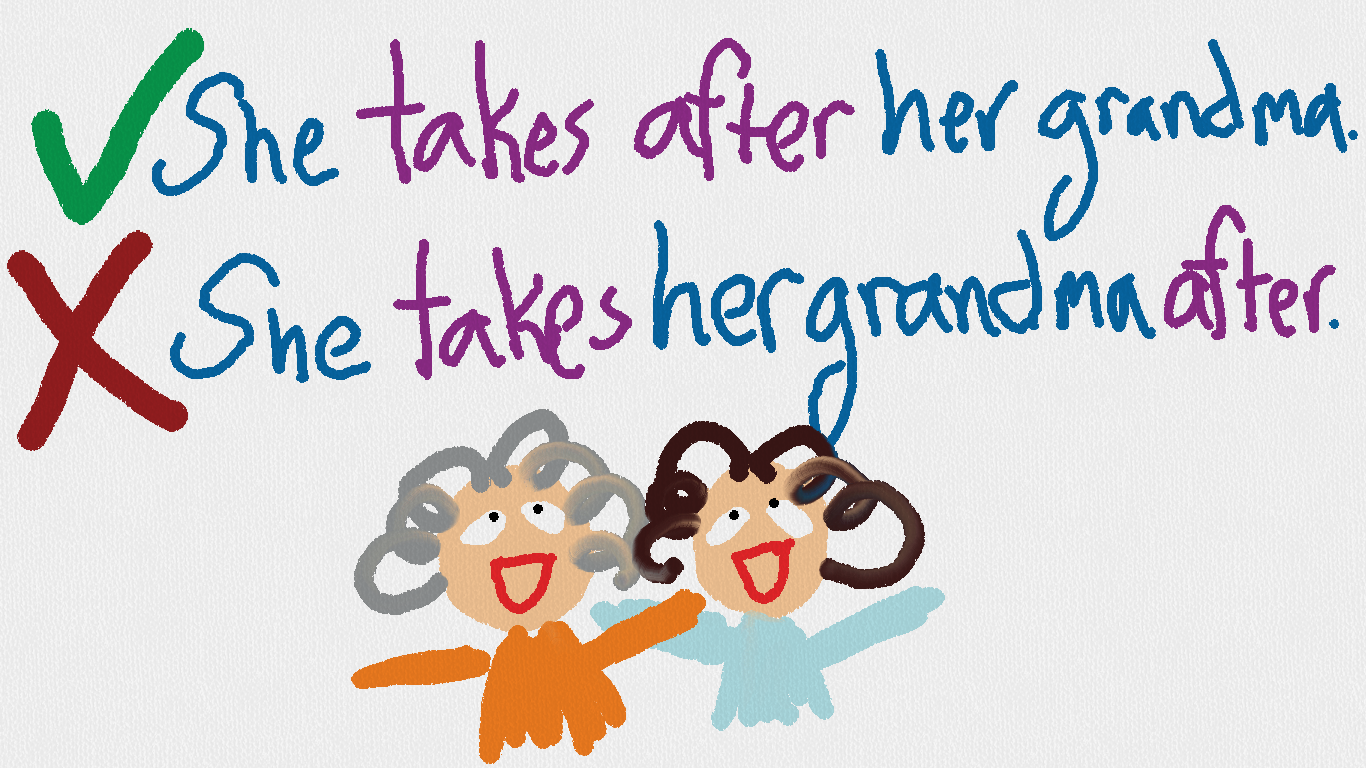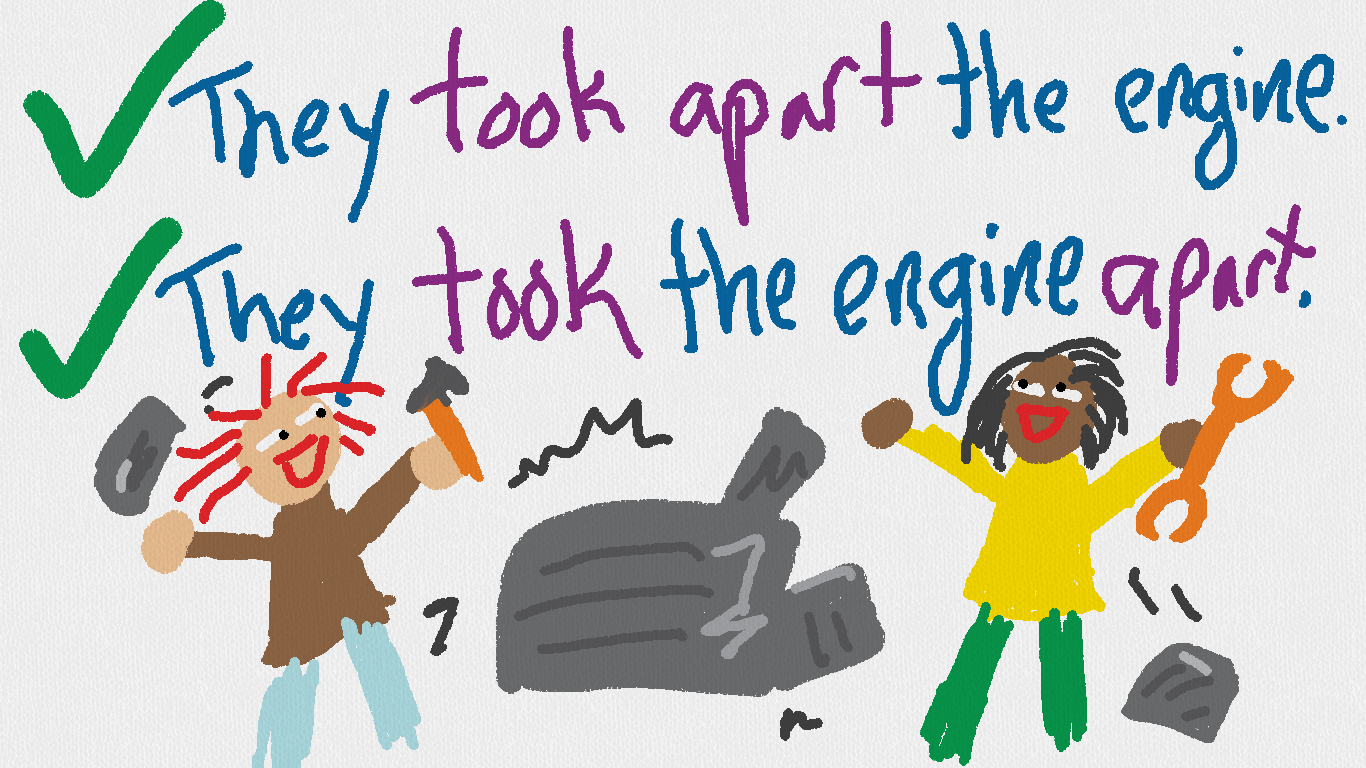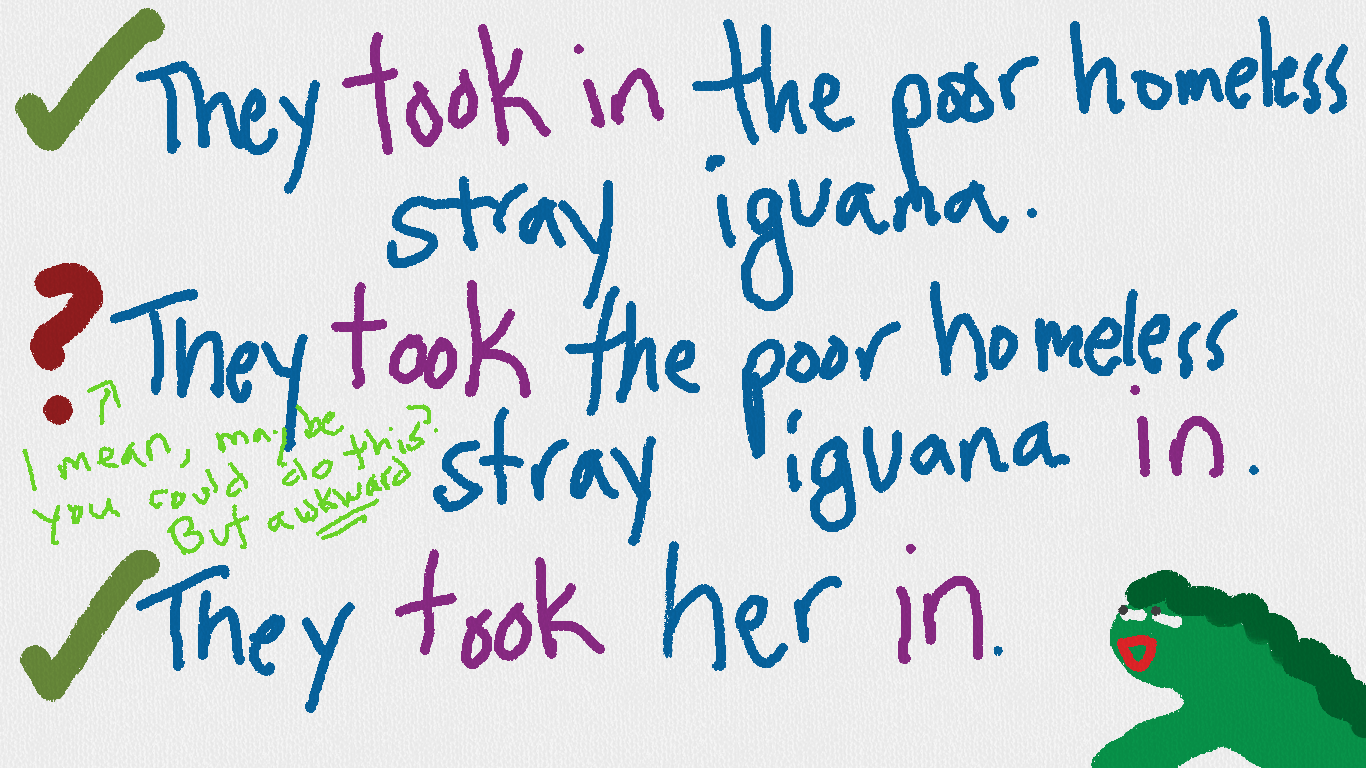Dear Language Nerd,
Why do we say “stand up”? Doesn’t “stand” cover everything?
-Andy
***
Dear Andy,
Okay, here’s the plan: first, I’ll explain what a phrasal verb is, and then, right when you’re feeling secure, I will totally blindside you by saying that “stand up” isn’t really a phrasal verb after all. Ready? Let’s roll.
A phrasal verb is a verb made of at least two, sometimes three words. One of the words is the main verby part, a verb that can also be used alone. The other part is a preposition or particle that changes the meaning of the main verb.* Three-part verbs get a preposition and a particle, and boy are they smug about it.
How ‘bout some examples from one of our phrasaliest verbs, “take”:
I took his pencil.
They took apart the engine.
She takes after her grandma.
Somebody, take out the trash!
One solid punch took him out.
We took up a collection after the tornado.
I’ll take you up on that offer.
They took in the poor homeless stray iguana.
So, I am sure you are currently asking yourself, which of these are prepositions and which are particles? Fortunately, there’s an easy way to check. Prepositions must come in front of their objects:
Whereas particles can go either way:
There’s one more way these can trip you up, though. If there’s a whole batch of words, like “the poor homeless stray iguana,” then a particle would just get lost stuck out behind it, so the particle always goes in front. If you shorten up the phrase, though, you can move the particle around again, so it is in fact a particle and not a preposition.
Particle verbs are the reason, as Winston Churchill probably did not indicate, that the occasionally-advocated grammar “rule” about not ending a sentence with a preposition is pure absurdity.** English is swamped with phrasal verbs, and by gum, sometimes the particles come at the end. Deal.
Okay, get ready to be totally blindsided by a plot twist that definitely wasn’t foreshadowed or directly stated in the first sentence: “stand up” isn’t really a phrasal verb. So why have we been talking about them? Have I just lost it? Caught it’s-my-blog-and-I’ll-blog-what-I-want-to fever? No! “Stand up” is like a baby phrasal verb. Stay with me, here.
Part of being a real, big-boy-pants-wearin’ phrasal verb is that the meaning of the whole verb can’t be guessed from the meaning of the parts. You’re not likely to get “adopt” from “take” + “in.” You’re surely not going to get “resembles due to ancestry” from “take” + “after.” But if you see “stand” + “up,” you’re probably going to be able to figure it out. The “up” just means what it usually means – go higher than you were before. It’s too easy.
However! This kind of too-obvious verb pair is where phrasal verbs get their start. You begin with “stand” alone, but perhaps most of the people around you already standing and you want to address the occupant of the sole recliner in the room. If you just say “Hey, stand!” all these other people might be like, “yo, already standing, doofus.” So you better accent that you want motion from a lower position to a higher one. Bam, “stand up.” Recliner is yours.*** But when enough of these upstanding people start using your phrase, they’ll start elaborating too. They’ll use it metaphorically. They’ll toss meanings into it that are only tenuously connected. And soon enough you leave behind “stand up” in the sense of “get outta that chair” (which is not a phrasal verb) and end up at “stand up” in the sense of “I waited for my date for three hours at the movie theater, and that @$^@$%! never showed” (which is totally a phrasal verb).****
There you go: single verb to verb with literal preposition hanger-on to verb with metaphorical particle hanger-on. We’re done here. Stand down.
Yours,
The Language Nerd
* In fact, people who are really serious about this subject often don’t allow verbs with prepositions into the phrasal verbs club at all, shunting them off into their own “prepositional verbs” category. But we are not that serious.
** Though you can totally end a sentence with a regular preposition, too. Lots of the weird grammar rules out there are nonsesnse, y’all.
*** Finally actually answered the question, whoo!
**** I wish I could be more specific about the metaphorical link between standing up and standing someone up, but my usual etymology sources are failing me, and all I’m finding elsewhere is rampant speculation. If you have evidence and/or rampant speculation, feel free to send it in.
Got a language question? Ask the Language Nerd! asktheleagueofnerds@gmail.com
Or: Twitter @AskTheLeague / facebook.com/asktheleagueofnerds
References this week include this paper, this Wiki article, my syntax classes from college, and my awesome CELTA course, in which we considered how to teach The 600 Varieties of Take to a non-native speaker. References decidedly do not include my old German classes, which got me mixed up Germanic separable verbs, which is what I first said to Andy when he asked me this in person. My bad, Andy. This is the real answer, probably in much more detail than you were looking for.



Reblogged this on ENGLISH LANGUAGE REVIEW .
[…] Two Parter, Parts One and Two (theleagueofnerds.wordpress.com) […]